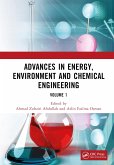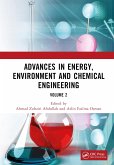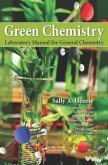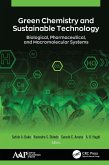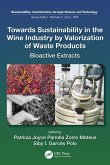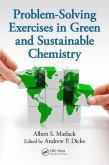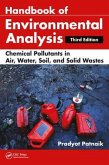Nanotechnologies in Green Chemistry and Environmental Sustainability
Herausgeber: Abdul Karim, Samsul Ariffin
Nanotechnologies in Green Chemistry and Environmental Sustainability
Herausgeber: Abdul Karim, Samsul Ariffin
- Gebundenes Buch
- Merkliste
- Auf die Merkliste
- Bewerten Bewerten
- Teilen
- Produkt teilen
- Produkterinnerung
- Produkterinnerung
Nanotechnologies represent a fast-growing market and this unique volume highlights the current studies in applied sciences on sustainability of green science and technology. The chapters include modelling, machine learning, nanotechnology, nanofluids, nanosystems, smart materials and applications and solar and fuel cells technology.
Andere Kunden interessierten sich auch für
![Advances in Energy, Environment and Chemical Engineering Volume 1 Advances in Energy, Environment and Chemical Engineering Volume 1]() Advances in Energy, Environment and Chemical Engineering Volume 1163,99 €
Advances in Energy, Environment and Chemical Engineering Volume 1163,99 €![Advances in Energy, Environment and Chemical Engineering Volume 2 Advances in Energy, Environment and Chemical Engineering Volume 2]() Advances in Energy, Environment and Chemical Engineering Volume 2143,99 €
Advances in Energy, Environment and Chemical Engineering Volume 2143,99 €![Green Chemistry Laboratory Manual for General Chemistry Green Chemistry Laboratory Manual for General Chemistry]() Sally A. Henrie (Union University, Jackson, Tennessee, USA)Green Chemistry Laboratory Manual for General Chemistry122,99 €
Sally A. Henrie (Union University, Jackson, Tennessee, USA)Green Chemistry Laboratory Manual for General Chemistry122,99 €![Green Chemistry and Sustainable Technology Green Chemistry and Sustainable Technology]() Green Chemistry and Sustainable Technology92,99 €
Green Chemistry and Sustainable Technology92,99 €![Towards Sustainability in the Wine Industry by Valorization of Waste Products Towards Sustainability in the Wine Industry by Valorization of Waste Products]() Towards Sustainability in the Wine Industry by Valorization of Waste Products79,99 €
Towards Sustainability in the Wine Industry by Valorization of Waste Products79,99 €![Problem-Solving Exercises in Green and Sustainable Chemistry Problem-Solving Exercises in Green and Sustainable Chemistry]() Albert S. MatlackProblem-Solving Exercises in Green and Sustainable Chemistry40,99 €
Albert S. MatlackProblem-Solving Exercises in Green and Sustainable Chemistry40,99 €![Handbook of Environmental Analysis Handbook of Environmental Analysis]() Pradyot Patnaik (New Jersey Institute of Technology, Newark, USA)Handbook of Environmental Analysis261,99 €
Pradyot Patnaik (New Jersey Institute of Technology, Newark, USA)Handbook of Environmental Analysis261,99 €-
-
-
Nanotechnologies represent a fast-growing market and this unique volume highlights the current studies in applied sciences on sustainability of green science and technology. The chapters include modelling, machine learning, nanotechnology, nanofluids, nanosystems, smart materials and applications and solar and fuel cells technology.
Hinweis: Dieser Artikel kann nur an eine deutsche Lieferadresse ausgeliefert werden.
Hinweis: Dieser Artikel kann nur an eine deutsche Lieferadresse ausgeliefert werden.
Produktdetails
- Produktdetails
- Sustainability: Contributions through Science and Technology
- Verlag: Taylor & Francis Ltd
- Seitenzahl: 262
- Erscheinungstermin: 9. Dezember 2022
- Englisch
- Abmessung: 161mm x 239mm x 25mm
- Gewicht: 534g
- ISBN-13: 9781032341323
- ISBN-10: 1032341327
- Artikelnr.: 65610730
- Herstellerkennzeichnung
- Libri GmbH
- Europaallee 1
- 36244 Bad Hersfeld
- gpsr@libri.de
- Sustainability: Contributions through Science and Technology
- Verlag: Taylor & Francis Ltd
- Seitenzahl: 262
- Erscheinungstermin: 9. Dezember 2022
- Englisch
- Abmessung: 161mm x 239mm x 25mm
- Gewicht: 534g
- ISBN-13: 9781032341323
- ISBN-10: 1032341327
- Artikelnr.: 65610730
- Herstellerkennzeichnung
- Libri GmbH
- Europaallee 1
- 36244 Bad Hersfeld
- gpsr@libri.de
Samsul Ariffin Bin Abdul Karim is an Associate Professor with Software Engineering Programme, Faculty of Computing and Informatics, Universiti Malaysia Sabah (UMS), Malaysia. He obtained his PhD in Mathematics from Universiti Sains Malaysia (USM). He is a Professional Technologists registered with Malaysia Board of Technologists (MBOT), No. Perakuan PT21030227. His research interest includes numerical analysis, machine learning, approximation theory, optimization, science, and engineering education as well as wavelets. He has published more than 140 papers in Journals and Conferences including three Edited Conferences Volume and 60 book chapters. He was the recipient of Effective Education Delivery Award and Publication Award (Journal & Conference Paper), UTP Quality Day 2010, 2011 and 2012, respectively. He was Certified WOLFRAM Technology Associate, Mathematica Student Level. He also has published ten books with Springer Publishing including five books with Studies in Systems, Decision and Control (SSDC) series, one book with Taylor and Francis/CRC Press, one book with IntechOpen and one book with UTP Press. Recently he has received Book Publication Award in UTP Quality Day 2020 for book Water Quality Index (WQI) Prediction Using Multiple Linear Fuzzy Regression: Case Study in Perak River, Malaysia, that was published by SpringerBriefs in Water Science and Technology in 2020.
Chapter 1 Introduction
Chapter 2 Phase Identification, Morphology, and Compressibility of Scallop
Shell Powder (Amusium Pleuronectes) for Bone Implant Materials
Chapter 3 High Pressure Die Casting Simulation for Oil Pan Production
against Its Porosity, Shrinkage, and Niyama Criterion
Chapter 4 Thermophysical Properties of Nanolubricant SAE 5W-30 with
additional Al2O3, TiO2, and Hybrid Al2O3-TiO2 for Motorcycle Performance
Chapter 5 Heat Transfer Performance of Water, Ethylene Glycol and
Water-Ethylene Glycol as Base Fluid Dispersed by TiO2 Nanoparticle: CFD
Modelling on Double Pipe Heat Exchanger
Chapter 6 Microstructure Change of Aluminum 6061 on Natural and Artificial
Aging
Chapter 7 Characterisation of self-healing concrete incorporating plastic
waste as partial material substitution
Chapter 8 Graded concrete: Towards eco-friendly construction by material
optimization
Chapter 9 Performance of surgical blades from biocompatible bulk metallic
glasses and metallic glass thin films for sustainable medical devices
improvement
Chapter 10 Synthesis and Characterization of Zinc Ferrite as Nanofluid Heat
Exchanger Deploying Co-Precipitation Method
Chapter 11 A Study of Risk Assessment in The Nanomaterials Laboratory of
Mechanical Engineering Department and The Materials Physics Laboratory Of
Department Of Physics At State University Of Malang
Chapter 12 Fabrication and Characterization of Dye Sensitized Solar Cell in
Various Metal Oxide Structure
Chapter 13 Characterizations of Amino-Functionalized Metal-Organic
Framework Loaded with Imidazole
Chapter 14 Green removal of Bisphenol A (BPA) from aqueous media using
Zr-based metal-organic frameworks (MOF)
Chapter 2 Phase Identification, Morphology, and Compressibility of Scallop
Shell Powder (Amusium Pleuronectes) for Bone Implant Materials
Chapter 3 High Pressure Die Casting Simulation for Oil Pan Production
against Its Porosity, Shrinkage, and Niyama Criterion
Chapter 4 Thermophysical Properties of Nanolubricant SAE 5W-30 with
additional Al2O3, TiO2, and Hybrid Al2O3-TiO2 for Motorcycle Performance
Chapter 5 Heat Transfer Performance of Water, Ethylene Glycol and
Water-Ethylene Glycol as Base Fluid Dispersed by TiO2 Nanoparticle: CFD
Modelling on Double Pipe Heat Exchanger
Chapter 6 Microstructure Change of Aluminum 6061 on Natural and Artificial
Aging
Chapter 7 Characterisation of self-healing concrete incorporating plastic
waste as partial material substitution
Chapter 8 Graded concrete: Towards eco-friendly construction by material
optimization
Chapter 9 Performance of surgical blades from biocompatible bulk metallic
glasses and metallic glass thin films for sustainable medical devices
improvement
Chapter 10 Synthesis and Characterization of Zinc Ferrite as Nanofluid Heat
Exchanger Deploying Co-Precipitation Method
Chapter 11 A Study of Risk Assessment in The Nanomaterials Laboratory of
Mechanical Engineering Department and The Materials Physics Laboratory Of
Department Of Physics At State University Of Malang
Chapter 12 Fabrication and Characterization of Dye Sensitized Solar Cell in
Various Metal Oxide Structure
Chapter 13 Characterizations of Amino-Functionalized Metal-Organic
Framework Loaded with Imidazole
Chapter 14 Green removal of Bisphenol A (BPA) from aqueous media using
Zr-based metal-organic frameworks (MOF)
Chapter 1 Introduction
Chapter 2 Phase Identification, Morphology, and Compressibility of Scallop
Shell Powder (Amusium Pleuronectes) for Bone Implant Materials
Chapter 3 High Pressure Die Casting Simulation for Oil Pan Production
against Its Porosity, Shrinkage, and Niyama Criterion
Chapter 4 Thermophysical Properties of Nanolubricant SAE 5W-30 with
additional Al2O3, TiO2, and Hybrid Al2O3-TiO2 for Motorcycle Performance
Chapter 5 Heat Transfer Performance of Water, Ethylene Glycol and
Water-Ethylene Glycol as Base Fluid Dispersed by TiO2 Nanoparticle: CFD
Modelling on Double Pipe Heat Exchanger
Chapter 6 Microstructure Change of Aluminum 6061 on Natural and Artificial
Aging
Chapter 7 Characterisation of self-healing concrete incorporating plastic
waste as partial material substitution
Chapter 8 Graded concrete: Towards eco-friendly construction by material
optimization
Chapter 9 Performance of surgical blades from biocompatible bulk metallic
glasses and metallic glass thin films for sustainable medical devices
improvement
Chapter 10 Synthesis and Characterization of Zinc Ferrite as Nanofluid Heat
Exchanger Deploying Co-Precipitation Method
Chapter 11 A Study of Risk Assessment in The Nanomaterials Laboratory of
Mechanical Engineering Department and The Materials Physics Laboratory Of
Department Of Physics At State University Of Malang
Chapter 12 Fabrication and Characterization of Dye Sensitized Solar Cell in
Various Metal Oxide Structure
Chapter 13 Characterizations of Amino-Functionalized Metal-Organic
Framework Loaded with Imidazole
Chapter 14 Green removal of Bisphenol A (BPA) from aqueous media using
Zr-based metal-organic frameworks (MOF)
Chapter 2 Phase Identification, Morphology, and Compressibility of Scallop
Shell Powder (Amusium Pleuronectes) for Bone Implant Materials
Chapter 3 High Pressure Die Casting Simulation for Oil Pan Production
against Its Porosity, Shrinkage, and Niyama Criterion
Chapter 4 Thermophysical Properties of Nanolubricant SAE 5W-30 with
additional Al2O3, TiO2, and Hybrid Al2O3-TiO2 for Motorcycle Performance
Chapter 5 Heat Transfer Performance of Water, Ethylene Glycol and
Water-Ethylene Glycol as Base Fluid Dispersed by TiO2 Nanoparticle: CFD
Modelling on Double Pipe Heat Exchanger
Chapter 6 Microstructure Change of Aluminum 6061 on Natural and Artificial
Aging
Chapter 7 Characterisation of self-healing concrete incorporating plastic
waste as partial material substitution
Chapter 8 Graded concrete: Towards eco-friendly construction by material
optimization
Chapter 9 Performance of surgical blades from biocompatible bulk metallic
glasses and metallic glass thin films for sustainable medical devices
improvement
Chapter 10 Synthesis and Characterization of Zinc Ferrite as Nanofluid Heat
Exchanger Deploying Co-Precipitation Method
Chapter 11 A Study of Risk Assessment in The Nanomaterials Laboratory of
Mechanical Engineering Department and The Materials Physics Laboratory Of
Department Of Physics At State University Of Malang
Chapter 12 Fabrication and Characterization of Dye Sensitized Solar Cell in
Various Metal Oxide Structure
Chapter 13 Characterizations of Amino-Functionalized Metal-Organic
Framework Loaded with Imidazole
Chapter 14 Green removal of Bisphenol A (BPA) from aqueous media using
Zr-based metal-organic frameworks (MOF)


